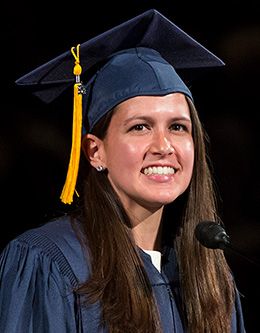President Uchtdorf, Elder Cardon, President Samuelson, faculty, family, and friends, it is an honor to stand before you today on this special occasion and to express to you the gratitude of each of us as graduates for all of your love and support over the past several years. And to you, my fellow graduates, you are truly an inspiring sight today. I am grateful for this opportunity to share with you a few words.
When I first set foot on the BYU campus as a student, I had a plan. I was here to soak up every scrap of knowledge I could find that related to biochemistry, perform amazing research, go on to graduate school, and ultimately make some sort of scientific discovery that would forever change the world. And for me it all started with my 8 a.m. chemistry class. Despite the early hour, I loved it! I felt that my mind was expanding and the horizons were broadening right before my eyes. As I sat in my lab class and performed what I realize now were very rudimentary experiments and watched the solutions in my beaker change color, I felt that the key to understanding the universe was finally within my reach.
However, over the next couple of years, while my belief in chemistry did not slacken, I began to feel an increasing sense of frustration with myself. I felt that the jewels of knowledge that I had crammed, packed, and piled into my mind were seeping through the cracks in my memory and slipping away. Although I had once done well on my organic chemistry tests, I could no longer remember what a Diels-Alder reaction even was, nor could I sit down and diagram every intermediate of the glycolysis cycle as I once could. It seemed that the more knowledge I worked to pack into my mind, the more things seemed to slip out. I began to wonder what the point of my education even was. If I couldn’t remember and retain all the facts that I had labored to learn, why was I even here? How would I ever be prepared to go forth and make a difference in the world?
At this rather critical juncture in my college experience, a professor—Dr. Steven Goates in the Chemistry Department, who had become a good friend and mentor—sensed my frustration and challenged me to seek out the answers to these two questions: What had I really come here to BYU to learn? and How would it help me to go forth to serve?
I would like to share with you today some of the reflections I have had over the past couple of years about what it really means to “enter to learn” and “go forth to serve” and how we can continue to fulfill the purpose of our BYU education as we take these next beginning steps in our lives.
Contrary to my initial opinion, what we came here to BYU to learn was not just a series of facts or skills; we came to learn patterns of thinking, methods of problem solving, and techniques for lifelong learning. For me, chemistry really has unlocked the mysteries of the universe—not just because it has given me knowledge but because it has taught me how to learn. Whether your key to the universe has been chemistry, English, business, or education, we have all learned similar lessons. We have learned that true education starts with a desire, a craving for greater understanding. We have also learned how to create solutions, experiment on those solutions, and interpret the results. And, most important, we have learned to pursue that which is desirable and entices us to do good. Indeed, we have learned that the Lord’s pattern of learning outlined in Alma 32:27–28—to begin with a desire, to experiment upon the word, and to pursue that which bears good fruit—applies to academic as well as spiritual learning.
As we now prepare to leave this wonderful university and go forth to serve, it is imperative that we continue this process of lifelong learning. In a commencement address that he gave here at BYU in 2008, Elder David A. Bednar of the Quorum of the Twelve Apostles said:
Learning to love learning is central to the gospel of Jesus Christ, is vital to our ongoing spiritual and personal development, and is an absolute necessity in the world in which we do now and will yet live, serve, and work. [“Learning to Love Learning,” BYU commencement address, 24 April 2008]
As we move forward into the world, we must continue to ask questions, create solutions, and pursue that which enlarges our souls and enlightens our understanding. Only then will we be ready and capable instruments in the Lord’s hands as He moves His work forward in these the latter days, for the Lord needs passionate and engaged disciples in every branch of the social, political, and business worlds. Our ability to serve and benefit the world does not depend on the profession we choose but rather on our commitment to pursue that which is “virtuous, lovely, or of good report or praiseworthy” in all that we do (Articles of Faith 1:13).
To each of you, my fellow graduates, I offer my sincere congratulations on all that you have accomplished. Your potential is both unlimited and eternal. May God bless you in all that you go forth to do. Thank you.
© Brigham Young University. All rights reserved.

Megan Hirschi spoke as the representative of her graduating class at BYU commencement on 24 April 2014.


